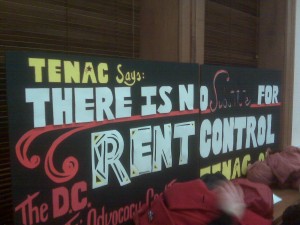LISTEN TO CYNTHIA POLS
Audio clip: Adobe Flash Player (version 9 or above) is required to play this audio clip. Download the latest version here. You also need to have JavaScript enabled in your browser.
D.C.’s rent control laws regulate the rents paid by tenants who live in buildings built prior to 1976. As it is currently written, every five years the District’s rent control laws must be renewed or they will expire. On December 31, 2010, rent control in D.C. would have disappeared had the D.C. Council not taken action last week. But simply renewing rent control without strengthening protections for tenants, as the D.C. Council did, may not be enough, according to Cynthia Pols, a tenant activist and organizer.
In her July testimony before the Committee on Housing and Workforce Development, chaired by At-large Councilmember Michael Brown, Cynthia Pols said the city must do more than just renew rent control. Pols said, “Fixing the District’s rent control laws is essential for the District’s future. It is one of the few tools the District government has to preserve and enhance the racially, ethnically, and economically diverse character of the City.”
Outside the D.C. Council Chamber, directly following her testimony, Pols said, “Essentially, your long-standing population, much of it African American, lives largely in rental properties. Same is true for the Latino population, they’re largely renters. So to the extent you erode and remove the protections they have from rent control, you ultimately make the places they live unaffordable and they have no choice but to depart the city.”
Pols continued, “So you get a whiter city in the end. And you get a richer city. And some of us wonder if, you know, some of the decision makers wouldn’t prefer that it be that way.”
Pols said, “They’re not ever going to state that because that’s not the kind of thing you want your constituents to know – that you want their kind to leave the city. But, you know, that may be that a lot of the decision makers would prefer that some of these things that preserve a very solid stock of rental housing as we have here – we have 55 percent or so of the city living in rental housing, that’s fairly unique in the country; there are that many renters here – so to the extent you start doing away with the legal framework that keeps that housing stock, that rental housing stock in place, you change the city. You change the city.”
Pols continued, “And if you’re going to do that you should be up front about it and say, ‘We want a different city.’ As opposed to just sub rosa, you know, pulling protections out here and there so that suddenly we have a different city and we never decided we were going to have a different city. So, I think that’s what’s going on.”

